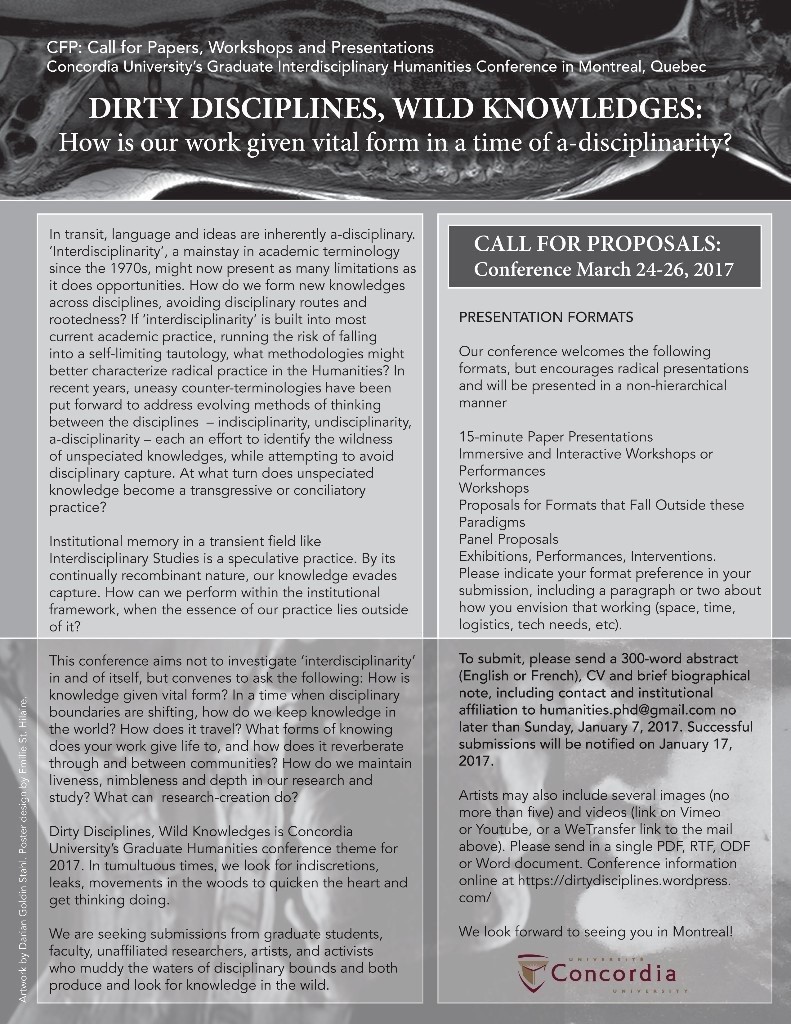The Humanities Student Association is comprised of all students currently enrolled in the Humanities PhD program and is organized by several Student Representatives (GSA).
Humanities PhD Graduate Student Association

A message from the Humanities GSA representatives:
We’d love to get you involved whether you’re a current or incoming student in the program. Please email us at humanities.phd@gmail.com.
1) Professional
We aim to improve the professional prospects of our program’s student body by coordinating the Annual Interdisciplinary Graduate Humanities Conference and working to maintain and elevate the program’s reputation and public exposure through various social media platforms. Past conferences include: Consumption and Detritus: Stories of Destruction and Reconstruction; Institutionalized; Pressing [against] Methods; eXhibitions.
2) Academic
We work closely with both the current students and the program director and administrator to increase communication and relevant responses to issues. The GSA team attends committee meetings and conducts regular meetings with the current program director.
3) Social
The GSA coordinates and plans socials, outings and reading/presentation groups for the student body. An official social kicks off the year every fall term and more casual gatherings are scattered throughout the year. The GSA has also recently initiated a reading/presentation group.
The GSA Bylaws:
The Humanities Student Association (HSA) is comprised of all students currently enrolled in the Humanities PhD program and is organized by several Student Representatives. The HSA is the main student initiative decision-making group of the Humanities PhD program. It is the HSA’s mission to help foster a vibrant student-based community of interdisciplinary scholars.
The Student Representatives of the Humanities PhD Program stand as the link between the Program and its administrators and participating faculty, and the student body. As Student Representatives serve Humanities students by proxy, they endeavour to maintain open lines of communication with their fellow students, welcome and solicit direct participation from the larger student body, and bring student perspectives and concerns to the Humanities Director and committee.
Duties of the Student Representatives: Welcome new students to the program and organize meetings for all students to review procedures and announce opportunities; Represent student interests in various faculty meetings throughout the year; Create opportunities for students to be actively involved in the direction of the program; Create opportunities for student issues and concerns to be addressed and to advocate on behalf of Humanities students when necessary; Help to ensure the commitment to rigorous and creative interdisciplinary research in the program is met; Host social events throughout the term to build a Humanities Community; Plan events, dialogue series and workshops throughout the year to meet student research needs; Oversee and plan the Humanities Annual Conference; Apply for and manage funds from the Graduate Student Association; Manage departmental funds allocated for student events; Work toward maintaining and improving the visibility of the Humanities program within the larger Concordia University community.
General Assemblies: At the beginning of every year (September/October) there will be one large general assembly where students will: Vote on new representatives; Discuss and organize interests and concerns that they wish to address in the next year; Discuss and begin to organize events that they would like to have in the next year. Throughout the year the representatives can call several general assemblies (min. three per year) to discuss the progress of student initiatives.
Representatives and Terms: There are four representatives each academic year, each maintaining their position for two years, with the exception of the first year representative. The student representative team is made up of:
1. Senior Representative Student Affairs
This position is filled by a student in year two or higher. This person is responsible for attending faculty meetings, and makings sure that student issues and concerns are being addressed. This person also works very closely with the other reps to help plan out events.
2. Senior Representative Events Planning
This position is filled by a student in year two or higher. This person is responsible for working with the Humanities students and administration to create a series of events that meet the needs and interests of the Humanities community.
3. Junior Representative
A first year student fills this position. This person is responsible for ensuring that first year concerns and issues are being addressed, as well as creating opportunities for first year students to connect to the rest of the Humanities community.
4. Treasurer
The position is filled by a student in year two or higher. This person is responsible for overseeing the budget and finances provided by the department and the GSA.
Membership and Elections Senior Representatives and Treasurer: At the end of the winter term the current student representative team will put a call out to fill the representative positions to be filled for the coming year. The representatives will then be selected via a vote at the first General Assembly. In order for representatives to be selected, quorum must be met. Junior Representatives: First year students will be informed during orientation in September about this position opening. Interested candidates can then put themselves up for nomination for the role. The position will be voted on at the first General Assembly.
By Law Changes: In order for these bylaws to be changed, several conditions must be met: Suggestions for by-law changes have to be sent out to the Humanities Community two weeks prior to a General Assembly; A discussion has to occur at the General Assembly about the proposed bylaw changes; The changes have to be voted on and quorum must be met; Changes to by laws can only twice a year Quorum. For quorum to be met, 10% of the number of students who are currently enrolled in the program must be present and must vote on an issue.
Mailing Address: Centre for Interdisciplinary Studies in Society and Culture (CISSC) Concordia University LB-689, 1455 Boulevard de Maisonneuve Ouest, Montreal, Quebec, H3G 1M8, Canada
Street Address: McConnell Building / Library Building, Room 689, 1400 Boulevard de Maisonneuve Ouest, Montreal, Quebec H3G 2V8


